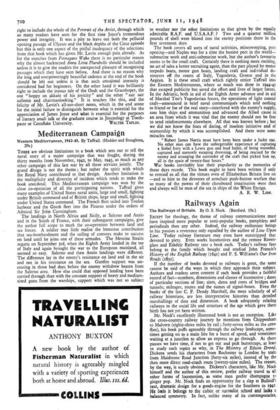Mediterranean Campaign
THERE are obvious limitations to a book which sets out to tell the naval story of a major campaign that was fought, during the thirty months from November, 1942, to May, 1945, as much as any other campaign of this last war by all three services jointly. The grand design is not the theme ; but rather the spirit with which the Royal Navy contributed to that design. Another limitation is the multiplicity and diversity of incident which tends to make the book anecdotal. This Mediterranean campaign was won by the close co-operation of all the participating nations. Taffrail gives many examples of United States naval units, large and small, fighting under British command and of British ships, large and small, fighting under United States command. The French fleet sailed into Toulon harbour and the Greek fleet into the Piraeus under the orders of Admiral Sir John Cunningham.
The landings in North Africa and Sicily, at Salerno and Anzio and in the South of France, with their subsequent campaigns, give the author full scope to mark the co-operation between land and sea forces. A soldier may little realise the Immense contribution that sea-bombardment and the sailing of convoys make to success on land until he joins one of these armadas. The Messina Straits regatta on September 3rd, when the Eighth Army landed in the toe of Italy and again brought the war to the European mainland, all seemed so easy. Salerno and then Anzio landings were different. The difference lay in the enemy's resistance on land and in the air and not in his resistance on the sea. Gunfire support was un- ceasing in those bad days before the enemy withdrew beaten from the Salerno area. How else could that opposed landing have been carried through than with the constant support of heavy and medium- sized guns from the warships, support which was not so subject to weather nor the other limitations as that given by the equally admirable R.A.F. and U.S.A.A.F. ? Two and a quarter million pounds of shell were blazed into the enemy positions there in the first seventeen days The book covers all sorts of naval activities, minesweeping, port opening—and Naples was for a time the busiest port in the world— submarine work and anti-submarine work, but the author's favourite seems to be the small craft. Certainly there is nothing more exciting, no set of tales a better recruiting agent, than the part played by motor torpedo boats, motor gun boats, landing craft and individual de- stroyers off the coasts of Italy, Yugoslavia, Greece and in the Aegean. It is these small craft which rightly entice Taffrail into the Eastern Mediterranean, where so much was done in 1944-45 that escaped publicity but saved the effort and lives of larger forces. In the Adriatic, both in aid of the Eighth Army advance and in aid of Marshal Tito's Yugoslavian forces, the operations of light coastal craft—announced in brief naval communiques which told nothing to friend or foe of the real story—interfered with the enemy's supply, cost him ships and ammunition and advanced the Allied cause in an area from which it was vital that the enemy should not be free to send reinforcements elsewhere. All that was known before ; but we did not know the feats of daring, of insolent initiative and of seamanship by which it was accomplished. And there were some miracles too.
"Robert James Norris must have been born under a lucky star.
No other man can have the unforgettable experience of capturing a Siebel ferry with a Lewis gun and loud hailer, of being wounded, captured and narrowly escaping drowning, of being rescued by the enemy and arranging the surrender of the craft that picked him up, all in the spaCe of twenty-four hours."
War books inevitably lose their popularity as the memories of those days recede. This book ought to have been written if only to remind us all that the virtues even of Elizabethan Britain live on —and to hint to the devotees of armchair push-button warfare that so many of the pawns of their chessboard imagination were then and always will be men of the sea in ships of the White Ensign.
A. R. W. Low.






























 Previous page
Previous page